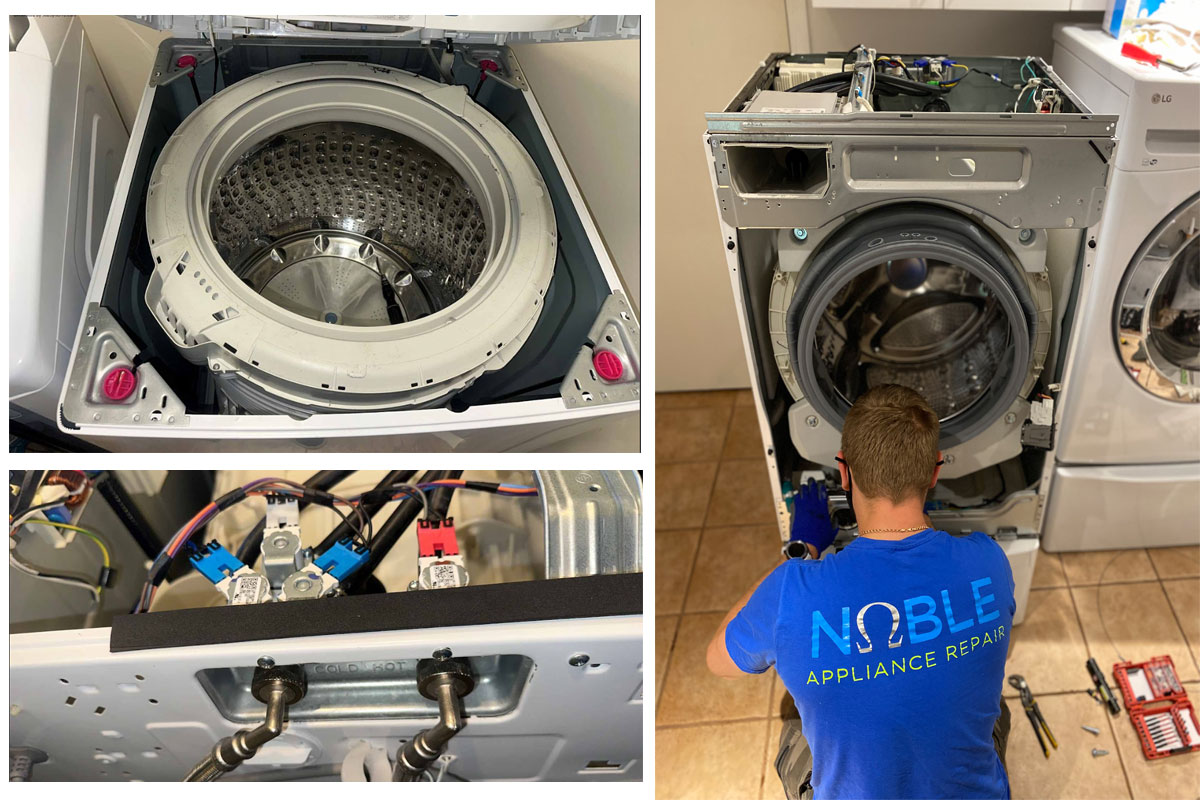Home | Blog | Repair or Replace Washing Machine: Making the Right Choice
Should You Repair or Replace Your Washing Machine? A Complete Guide
Our guide is designed to help you decide when to repair or replace a washing machine based on factors like age, cost, and reliability. Learn expert tips from Noble BHS, trusted appliance repair experts!
Why Is It Difficult to Decide Whether to Repair or Replace a Washing Machine?
Facing a broken washing machine presents a tough dilemma. Most homeowners must choose between repair costs and replacement while laundry piles up.
Your washing machine’s breakdown forces an immediate decision. The question of whether to repair or replace a washing machine impacts both your budget and household efficiency, with no clear answer about which path offers the most cost-effective solution.
Despite this pressure, you don’t need significant technical expertise to make the right choice. Several key factors will help determine whether washing machine repair makes sense or if purchasing a new one provides better long-term value for your laundry room. And today, we’ll help you navigate this decision with practical guidance. Here’s what you need to know:

Key Factors Playing a Role in Making the Right Decision
Several factors determine whether it is better to repair or replace a washing machine. Age and manufacturer’s warranty status create your foundation for decision making—modern washers last 7-12 years, making repairs logical for newer models, while replacement makes more sense for machines approaching a decade of service.
At the same time, usage patterns also significantly impact longevity and your repair calculus. Heavy laundry habits accelerate wear, with machines running daily aging nearly twice as fast as those used weekly. This usage intensity effectively adjusts your washer’s “functional age”, potentially making a 5-year-old heavily-used machine equivalent to an 8-year-old lightly-used one.
The repair-to-replacement cost ratio forms another critical consideration. Combined with part availability and whether current problems represent isolated issues or broader system failure, these factors create a complete decision framework. Now, let’s examine how to apply these key factors to your specific situation:
Age and Warranty Status
The first thing to check when deciding whether to repair or replace a washing machine is its age and warranty status. For machines under 3 years old, even major repairs are financially worthwhile, especially if the manufacturer’s warranty still covers parts or labor. A middle-aged washer (4-7 years) justifies moderate repairs, while machines approaching 10 years only justify minor repairs. Beyond this threshold, replacement typically offers better value as parts availability decreases and efficiency improvements in new models offset repair investments.
Frequency of Use of the Washing Machine
How often your washing machine breaks and how long it lasts relate to your usage patterns. Households doing daily loads face faster wear than those running 2-3 weekly cycles. Most top loaders handle 300-500 cycles annually before problems emerge. Heavy items like jeans stress components more than light clothes. Consider your usage when deciding between repair and replacement, as high-volume households may reach end-of-life faster than expected.
Cost of Repair vs. Replacement
In our guide on how much does appliance repair cost, we have mentioned a “half rule.” Repairs exceeding half the price of a new washer rarely make economic sense. This guideline is a very good point to find the best option for you, but this threshold should also be adjusted based on machine age, expected lifespan, and potential efficiency improvements in newer models.
Note: Newer washing machines can save significant money on electricity and water bills, with recent Energy Star models using up to 40% less electricity than units manufactured before 2015.
Availability of Parts
Parts availability also impacts repair viability. Older models often lack readily accessible components, making a new washer the logical choice when critical parts become scarce. Even if parts are available, long wait times can extend machine downtime, adding inconvenience costs to repair expenses.
Frequency and Severity of the Issues
Recurring issues reveal critical insights about your machine’s future. A washing machine that stops working repeatedly signals systemic decline. Minor issues like door seal failures justify repairs, while major components like motor or transmission failures often indicate broader deterioration, making repair less cost-efficient. Consider replacement when problems cluster within short timeframes, especially when it is a third repair in 6 months.
Common Washing Machine Problems You May Encounter
Now that we’ve examined the key factors for evaluating your washing machine’s future, let’s look at common problems you might face. Understanding these typical breakdowns can also help in determining when washing machine repair makes sense, and when you should consider buying a new unit.
Leaks and Drainage Issues
Leaking water from washing machines signals issues ranging from simple seal failures to serious pump problems. Some of these problems are easy to fix yourself, like clearing a clogged drain filter or tightening a loose hose connection, while others involve complex internal components requiring professional skills.
Note: Never attempt DIY fixes when water meets electrical components, as sparking wires create significant safety issues.
Washer repair makes sense for leaks in machines under 7 years old, but becomes questionable in older models. Persistent leaking water risks structural damage and mold growth, requiring prompt professional evaluation. Leaks are often not very cost-intensive repairs, so in this case, the decision on whether to repair or replace the washing machine depends primarily on the machine’s age and the specific source of the leak.
Noises or Vibrating During Cycles
Unusual noises often signal worn bearings or drum support issues. Grinding sounds suggest potential transmission problems, while banging typically means unbalanced loads or damaged components. Repairs are cost-effective for newer machines but questionable for models over 5 years that consistently produce noise and performance issues. In this case, the repair or replace washing machine decision hinges on both noise severity and the age of your appliance.
Failure to Start or Complete Cycles
Washing machines that fail to start often have electrical issues, control panel problems, or door lock malfunctions. These symptoms range from simple power connection problems to serious electronic or even motor failures. If it’s a simple fix (e.g., door lock malfunctions), repair makes economic sense for almost all models; however, for machines over 7 years, serious repairs in cases like motor malfunctions are questionable. Here, your decision should balance diagnosis fees against the price of a new unit (following the “half rule” mentioned above). Most electrical issues cost $100–250 to repair, making the age factor especially critical in this scenario.
Poor Cleaning Performance
Declining wash quality often stems from detergent buildup, filter clogs, or water supply problems. If poor performance is due to unobvious reasons, it’s better to request service before deciding on replacement. These issues may cost anywhere from $90 to $350, depending on the underlying cause and parts required. For machines under 5 years old, washer repair is often more cost-effective compared to buying a new washing machine. For older models with multiple performance issues, the efficiency improvements in a new one often offset repair investments within 2–3 years.
Cases When It’s Better to Consider Repairing Your Washing Machine
Here are examples of specific cases when repairing your washing machine makes sense:
- Your machine is less than 5 years old with a high-end brand that’s designed to last 15+ years;
- The repair involves simple components like a $20–40 door latch, a $15–30 drain filter, or a $50–75 water inlet valve;
- Diagnosis shows a single failed component rather than multiple issues appearing simultaneously;
- The repair cost is less than 25% of a comparable new machine’s price (e.g., $150 fix on a $700 washer);
- You own a premium model with special features that would cost $1,200+ to replace;
- The machine has an extended warranty covering parts and labor;
- Your model has a strong reliability record, and this is its first significant issue.
When Replacing a Washing Machine Is the Best Option
And here are cases when replacing your washing machine makes more sense:
- Your current machine is over 10 years old with multiple failing components;
- Repair costs exceed 50% of a new washing machine’s price (e.g., $400 repair on a $700 machine);
- The machine has recurring problems despite previous repairs;
- You’ve already completed multiple repairs in the past 12–18 months;
- You’re facing a major component failure, like a motor or transmission in an older unit.
What We Learned About Choosing to Repair or Replace a Washing Machine
After servicing thousands of washing machines, we at Noble BHS have identified clear patterns in repair economics. Machines under 3 years old justify almost any repair, with 90% of fixes costing less than 30% of replacement value. For 4-6 year old machines, we recommend repairs only for isolated issues affecting a single component. Machines over 8 years old should be thoroughly inspected before any repair investment, as these units often develop secondary problems shortly after fixes that can quickly exceed the cost of a new appliance.
Not sure if it’s better to repair or replace a washing machine? Call Noble BHS at (678) 646-4346 or book through our website for an expert assessment tailored to your specific situation. Our technicians will evaluate your machine’s age, condition, and repair history alongside current energy efficiency benchmarks. We provide honest recommendations for all our customers, helping you make the smartest choice based on your specific circumstances and budget priorities.
Tips for Prolonging Your Washing Machine Life
- Proper loading – Avoid overloading and distribute clothes evenly to prevent strain on the drum bearing.
- Use less water and detergent – Most people use 2–3 times more than needed; follow minimal recommendations.
- Monthly filter cleaning – Prevents buildup and drainage issues by cleaning the filter regularly.
- Keep the door open – Leaving it ajar after washing prevents mold and mildew growth.
- Run maintenance cycles – Use hot water and vinegar monthly to remove internal buildup.
- Ensure ventilation clearance – Maintain at least 4 inches of space for proper airflow.
- Annual servicing – After 5 years of use, consider professional checkups to catch wear early.
- Use correct cycles – Choose the right wash settings for each load to reduce mechanical wear.
You may also be interested in
- Replace or Repair Your Appliances: A Complete Guide to Making the Right Choice
- Why Your Refrigerator Is Making Strange Noises – Causes & Fixes
- How Much Does Appliance Repair Cost in Atlanta: 2025 Guide
- Should You Repair or Replace Refrigerator When it Breaks Down?
- Why Your Fridge Is Making Loud Noise and How to Fix It
- Should You Repair or Replace Your Dishwasher?




